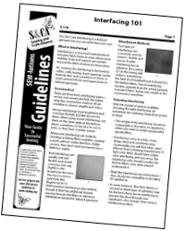 Building structure and support into a garment can be confusing and a recent query brought this to light. The question — What’s the difference between interfacing, lining, interlining and underlining?
Building structure and support into a garment can be confusing and a recent query brought this to light. The question — What’s the difference between interfacing, lining, interlining and underlining?
The answer: All of these terms refer to construction details that are usually hidden from view when you’re wearing a garment, but they serve an important function in maintaining the shape and comfort of your creation.
Interfacing is a support fabric used in areas that need more stability than just the fabric weight. For example, you’ll find interfacing in collars, cuffs, waistbands, closures (like buttonholes), and sometimes hems. In tailored garments, you may find interfacing under entire garment sections, and more than one type used within a single garment.
Lining is used to help hide the inner construction details of a garment, and also to help it slide off and on over other clothing with ease. Lining fabrics are usually slippery and silky, though other types may be used for effect. Lining is constructed separately from the garment and attached at facing or hem areas by hand or machine.
Interlining is a fabric added to a garment when more warmth is needed, like in a winter coat. It may be a heavy fabric with batting added, or a lighter weight one like flannel or fleece. Interlining can be constructed separately from the actual garment (it’s sometimes removable), or used as an underlining.
Underlining is a fabric added to fashion fabric for more body and/or opacity. It’s a separate layer attached to the corresponding garment fabric section wrong side, and then treated as one during construction. Pattern markings are often transferred to the underlining to avoid show-through on the garment fabric.
So, next time you’re in a fabric store, check out these offerings and add them to your projects where they’re needed. Follow the pattern directions for their use.